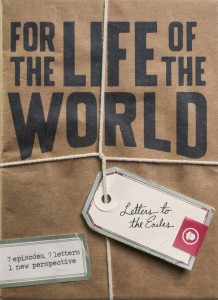Word is continuing to spread about For the Life of the World: Letters to the Exiles, the latest film series from the Acton Institute, which seeks to expand the Christian imagination when it comes to whole-life stewardship and cultural engagement.
With screenings and appearances at places like Q Nashville, Flourish San Diego, Acton U, Trinity Evangelical Divinity School, and Regent University, to name just a few, Christians from a variety of backgrounds and perspectives are getting a taste of the series and responding with enthusiastic praise.
Andy Crouch offers the following:
"For the Life of the World" (@LetterstoExiles) is the best treatment of faith & culture ever put on a screen. Just outstanding.
— Andy Crouch (@ahc) August 2, 2014
Daniel Melvill Jones calls it “outstanding for its cohesive use of creativity and imagination”:
Every episode features at least one visual illustration that later becomes an analogy for the teaching. A Rube Goldberg machine that attempts to cook Evan’s breakfast backfires and become an example of the banality of utilitarian work. A ruined paper lantern that lands in Evan’s front yard is later used as a moving visual illustration of how our lives in the world are offered up to God as a prayer. A punk motorcyclist arrives on Evan’s front porch and uses puppets to tell a illustrating the importance of a believers call to hospitality…
…Anyone who watches the series will be introduced or reminded of these doctrines, but Evan is not content to let such truths sit dormant on the view’s mental shelf. He brings them home by closing every episode with a “letter to exiles”, a hand written monologue. In these letters encourages us with the reminder that we carry these truths into our lives as the redeemed children of God, not through our own power but through the death and resurrection of Jesus Christ.
The Wilderness Crier calls it “one-third hipster, one-third fairy tale, and one-third practical theology for life”:
For the Life of the World is pretty darn amazing. That’s simply the best way to describe it. It boasts some phenomenal production value and strikes a perfect balance between whimsy and thought-provoking. The episode on wonder took my breath away. Four times. It is, without a doubt, the only series of practical, theological videos I would ever turn on and watch just for the fun of it. And I would. In a heartbeat. Because very few things can encourage, challenge, and entertain you like a good fairy tale, even a theological one.
My advice is that you take a chance and follow Mr. Koons down the rabbit-hole. For the Life of the World is something the church wants (quality entertainment) and needs (practical advice on how to live out our salvation). Do yourself and your community a favor and check this one out.
 At Capital Commentary, Byron Borger calls it “artfully expressed” and “thoughtfully inspiring”:
At Capital Commentary, Byron Borger calls it “artfully expressed” and “thoughtfully inspiring”:
The teaching interviews and bold cinematography are so artfully expressed, though, that the blend of neo-Calvinist and conservative Catholic social theories that form some of the theoretical/theological background of the films are hardly noticeable; they are what Calvin Seerveld would call “suggestion-rich” and allusive. And they are often illustrated, not preached, with curious narratives and fantastic footage in settings as diverse as Makoto Fujimura’s art studio and Dr. Tim Royer’s Neurocore clinic which studies brain-related neurological issues…
…I don’t think I’ve ever seen such a visually enjoyable Christian educational video curriculum, and I know I’ve never seen one so thoughtfully inspiring about a foundational Christian view of creation, culture, social life, and redemption.
Heard enough?
Watch it for yourself today at Flannel.org, or order it on DVD and Blu-ray.
[product sku=”1440”]

